When shopping for an air compressor, there’re two major options you’ll have to choose from. Oil lubricated compressors and oil-free compressors.
Though both perform the same function of compressing air, they are very different from each other in the way they work, makeup, and the type of application they’re designed for.
That is why it is very important that you know the difference between the two before spending a dime on any one.
In this article, we’re going to explain the differences between the two types, so you can choose the right one for your application.
Table of Contents
What Are The Differences?
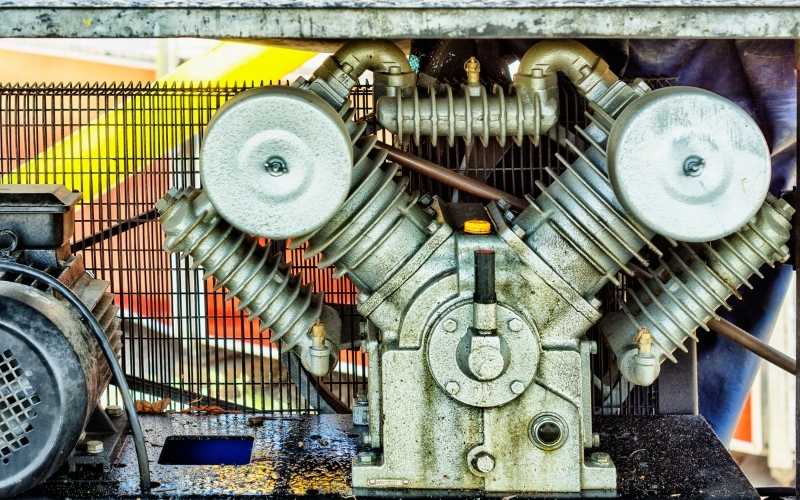
An air compressor is made up of 3 major parts, an electric motor or gas engine that provides mechanical power, a pump that draws in atmospheric air and compresses it, and a storage tank for the compressed air to flow into.
Talking about oil and oil-free compressors, we’re talking about the means of lubrication of the pump in the machine.
To compress air, the pump draws in air from the atmosphere with the aid of a piston or rotary screw in a chamber, where the air is further compressed by the reciprocating action of the piston, and the compressed air is finally discharged into the storage tank.
For the pump to work properly, the piston or rotary screw needs to move smoothly within its housing with the least amount of resistance or friction. To achieve that, it needs to be lubricated properly.
Oil air compressors makes use of oil for the lubrication. This means you have to add in oil and change the oil on a regular basis for the machine to continue functioning, just the way you change the oil of your gasoline generator or car.
On the other hand, oil-free air compressors does not need to be lubricated with oil. You don’t have to change any oil once you start using it.
To get around this, the pump mechanism like the piston and housing are coated with materials such as Teflon. It does not make use of oil at all.
Some oil-free pumps also use water in place of oil as the lubrication material and also for cooling the pump during operation.
Most manufacturers also use low horsepower and low RPM motors for running oil-free pumps to reduce wear, tear and noise produced while operating the machine.
Related: 10 Best Air Compressors For Powering Pneumatic Tools
Pros and Cons of an Oiled Compressor Vs Oil-free
Both type of machines have their own advantages and disadvantages. So, let explore them.
Noise Production
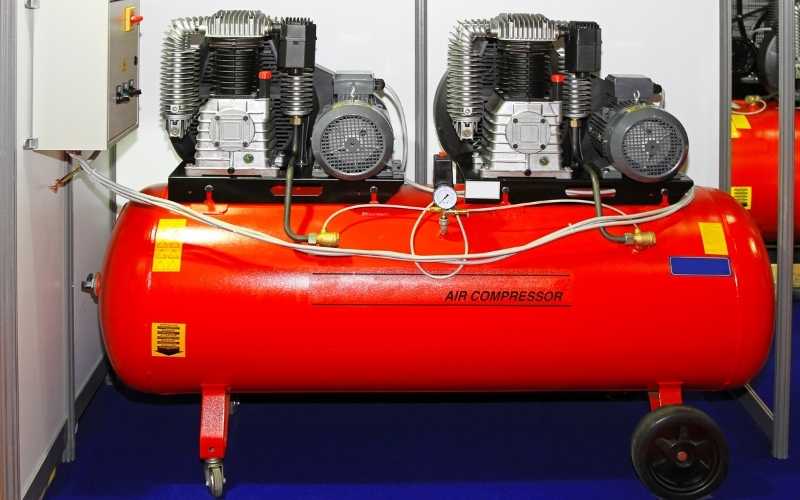
One major difference between oil compressors and oil-free compressors is in their noise production. Oil units are less noisy than oil-free units.
This is because the oil lubricated units are well lubricated than the oil-free ones. Hence, they run more quietly because there’s less friction between the moving parts of the pump.
So, if a noisy unit is going to pose some challenges for you, then you’d want to consider going for an oil lubricated unit. On the other hand, if you don’t care about the noise produced by the machine, then you can go for any of them.
Maintenance
Between an oil lubricated unit and an oil-free one, the oil lubricated air compressors require more maintenance than oil-free air compressors.
Just like the oil in your car, the oil in the oil lubricated unit will eventually go bad and will need replacement. That means you have to remove it and replace it with new oil.
You’ll need to carry on continuous routine maintenance when using a compressor with an oil-lubricated pump.
On the other hand, the oil-free units come with permanent lubrication and does not need to be lubricated again throughout the life of the machine. That’s why they require less maintenance.
Air Contamination
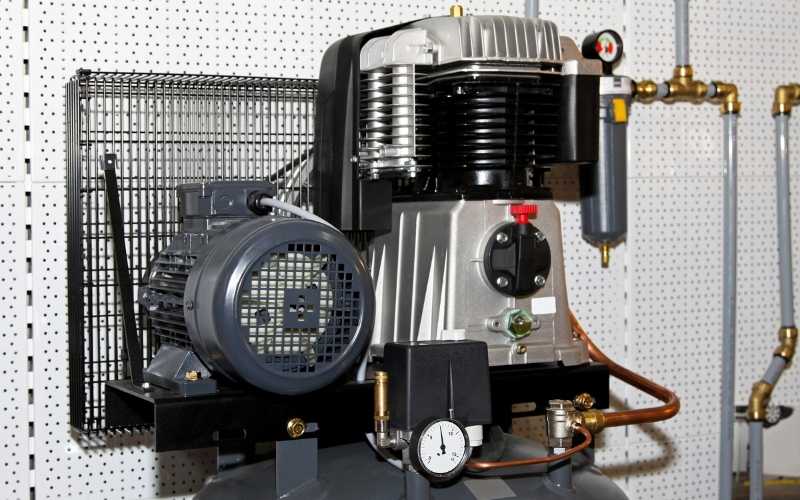
One of the major issue that arises when making use of oil lubricated air compressors is that the compressed air gets contaminated with the oil.
Depending on what you’re using the compressed air for, this can be very detrimental to the equipment or tools you’re powering with it and the projects you’re working on, or it may not affect anything at all.
For instance, if you run a company or workshop where a little bit of oil contamination in the compressed air will not be a huge problem, like an automobile workshop, then making use of an oil-lubed machine is fine.
You can run your air tools like air hammers, impact wrenches, sanders, sandblasters and ratchets with oil-lubed units without any problem.
On the other hand, if you run a company where any contamination no matter how minute it is, is a serious issue, then going for an oil free machine is the ideal thing to do.
For instance, high purity air is needed when you operate machines that process foods, medicine, electronics and other highly sensitive products.
Using oil contaminated air for tools like a paint prayer might also contaminate the paint with the oil, making it harder for the paint to dry or have a good finish.
You can use air filters and separators to remove the oil from the compressed air before passing it along to your tools and equipment, but if you really want no spec of oil in your system, going for an oil-free unit is the ideal thing to do.
Durability
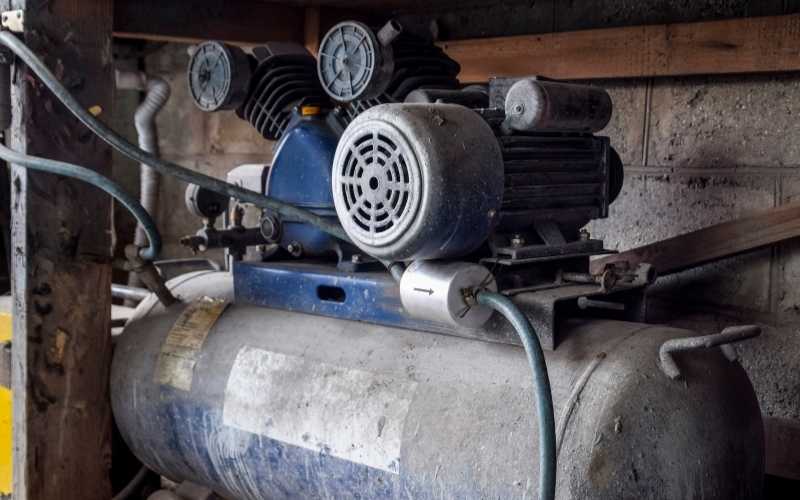
Durability is another important issue when it comes to oil-lubed and oil-free air compressors. Oil-lube units are obviously more durable than oil-free units, because with oil in the pump and less friction taking place, there’s not much wear and tear going on in the machine.
If the oil in the machine gets bad, all you have to do is replace it with a new one and you’re running like new again.
On the other hand, the permanent lubrication with materials like Teflon of oil-free units do wear out over time. Once it wears out, the machine gets louder and louder making more noise, until it eventually falls apart.
That’s why oil-lubed units are more durable and are used for commercial projects that require long working hours. They’re more durable because there’s constant lubrication to reduce friction and cool down the machine.
Cost
Oil-lubricated units are usually more expensive than oil-less machines because there’re more working parts in the oil lubricated units.
So, if you’re a homeowner who needs an air compressor machine for simple DIY projects at home like filling mattresses, car and bicycle tires, then a small oil-free unit is the way to go because it’s cheaper and easier to maintain.
On the other hand, if you need one for industrial projects like powering pneumatic tools in your dealership or automobile workshop, then going for a heavy duty oil-lubricated one is the better option, based on the amount of usage you hope to get out of the machine.
In this case, size is usually the deciding factor rather tan cost. So, consider the pros and the cons of an oiled unit vs an oil-free unit, and choose the best one that suits your needs.

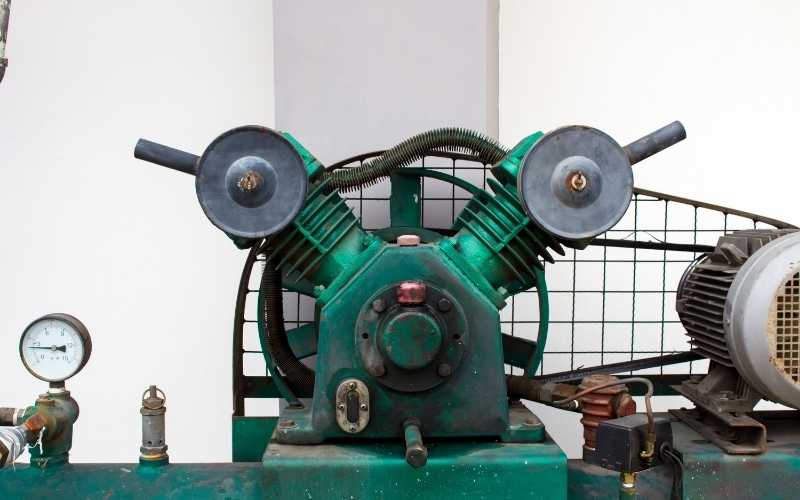
Cheers Guys
That was a very helpful little round up. I’ll stick with the oil.
I liked your article, very informative. I am a homeowner and need a compressor for filling car and bicycle tires also pool floats. Thats about it, so Ill go with an oilless compressor. Thanks for sharing your knowledge.
I’m glad you found this helpful.
The oilless manufacturers are claiming they can now run with the oil lube machines. While I do see 10 CFM @ 90 PSI machines I still do not think you will see any of them that run for 60 or more years like the Develbis Devair in our shop. –
I happen to have a Sears 2 Cyl 2 HP that we retired 20 years ago after running it for over 20 years running air tools 3 or more days a week. – It is still hooked up and if you close the circuit breaker it springs to life and still pumps air like it did when it was new. Worse yet the used Develbis 4-Cyl 2-stage compressor we replaced it with was made in 1957. It can out run our the sand blast cabinet. (Goes on at 125 PSI and cuts out at 150 and cycles on and off WHILE the sandblaster is running.) ,,,
Last week on the job we were on (We are millwright contractors) the company we were working for asked us to take a Dewalt 2 HP 200 PSI oilless in to our shop and tell them what was wrong with it. – The teflon “piston ring” was totally worn away at the sides of the piston. – The Dewalt was 18 months old DeWalt will not sell us a new piston. – It’s in the scrap hopper now .
We even got a Harbor freight 2HP Oil lubbed “Hot dog” compressor that we bought in an emergency over 20 years ago to run a small plasma cutter. – It has suffered every abuse known to man at the hands of union Ironworkers, including running impact guns after leaving it out in the rain and snow in the back of a pickup for a month at a time. It’s even been left plugged in with a leaky air hose over holiday week ends on jobsites more then once. – It is also still running and to this day we sometimes use it to run the Plasma Cutter in the field. No oiless would have survived that.
Bottom line, For a home owner to top off car tires there is nothing wrong with an oiless, but if you want to do any actual, even hobby grade, “Work” like impacts and air ratchets, or even nail guns do yourself a favor and get a small oil lubbed unit.
And as a rebuttle for the oilless guys howling about the all the “maintenance” required of the oil units (Checking the oil once a month and changing it once a year is all we have ever done with the shop compressors) Even the HF oil lube stuff will last you the rest of your life. With oilless, don’t figure on more then a year or two at the outside with daily use. And Guess What? Our HF ‘el cheap-o compressor has only had 2 oil changes in it’s whole life….when my animals threw it in the truck upside down and the oil ran out, and it’s just basic chinesium junk in the first place we didn’t think would last past the first job over 20 years ago.